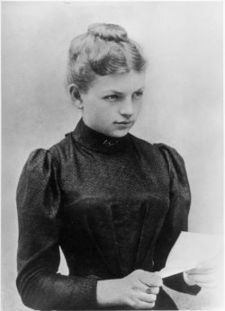- Clara Immerwahr
-
Clara Immerwahr 
Clara Immerwahr (1870–1915)Born June 21, 1870
Polkendorf near Breslau, German Empire, today PolandDied May 2, 1915 (aged 44)
Berlin-Dahlem, Germany
SuicideResidence Germany Nationality German Fields Chemistry Alma mater University of Breslau Doctoral advisor Richard Abegg Clara Immerwahr (June 21, 1870 – May 2, 1915) was a Jewish-German chemist and the wife of fellow chemist Fritz Haber.
Contents
Education
Immerwahr studied at the University of Breslau, attaining her degree and a Ph.D. in chemistry. She was the first woman Ph.D. at the University of Breslau.[1]
Marriage and work
Immerwahr married Haber in 1901. Constrained by the female stereotypes of the time, her scientific research was hindered. She instead contributed to her husband's work without recognition, translating his works into the English language.
Confiding in a friend, Immerwahr bemoaned her newfound subservient role as a housewife:
It has always been my attitude that a life has only been worth living if one has made full use of all one's abilities and tried to live out every kind of experience human life has to offer. It was under that impulse, among other things, that I decided to get married at that time... The life I got from it was very brief...and the main reasons for that was Fritz's oppressive way of putting himself first in our home and marriage, so that a less ruthlessly self-assertive personality was simply destroyed.[1][2]During World War I, Haber became a staunch supporter of the German military effort and played an important role in the development of chemical weapons (particularly poison gases). His efforts would culminate in his supervision of the first gas attack in military history in Flanders, Belgium on April 22, 1915. Haber thereafter returned home to Berlin.
Death
Shortly after her return, Immerwahr picked up Haber's military pistol and shot herself in the chest. She died in her son's arms. The morning after her death, Haber immediately left home to stage the first gas attack against the Russians on the Eastern Front.[3] [4] Her suicide remained largely in the dark; it was never in the newspapers and there is no evidence of an autopsy. The undocumented nature of her death has led to much controversy as to her motives.
Fritz Haber later married again. Eventually, he left Germany because of Nazi persecution. Fritz Haber died in Basel, Switzerland in 1934 and was cremated. Eventually Fritz's ashes and Clara's ashes were buried together in a cemetery in Basel.[2] Subsequently, Clara Immerwahr's son with Fritz Haber, Hermann Haber, emigrated to the United States and later committed suicide in 1946.[2] One of his other children, Ludwig ("Lutz") Fritz Haber (1921–2004, son of Fritz Haber and his second wife, Charlotte), published a book on the history of poison gas, The Poisonous Cloud (1986).[5]
See also
External links
Notes
- ^ a b Cornwell, John (2003). Hitler's Scientists, Science, War and the Devil's Pact. Penguin Press. p. 49. ISBN 0-14-20-0480-4.
- ^ a b c Stoltzenberg, Dietrich (1998). Fritz Haber: Chemiker, Nobelpreisträger, Deutscher, Jude: eine Biographie. Weinheim.
- ^ Cornwell, John (2003). Hitler's Scientists, Science, War and the Devil's Pact. Penguin Press. p. 65. ISBN 0-14-20-0480-4.
- ^ Stoltzenberg, Dietrich (1998). Fritz Haber: Chemiker, Nobelpreisträger, Deutscher, Jude: eine Biographie. Weinheim. p. 356.
- ^ "Lutz F. Haber (1921–2004)". University of Illinois at Urbana-Champaign. http://www.scs.uiuc.edu/~mainzv/HIST/awards/Dexter%20Papers/HaberDexterBioJJB.pdf.
Categories:- 1870 births
- 1915 deaths
- People from Wrocław
- People from the Province of Silesia
- German chemists
- Scientists who committed suicide
- University of Breslau alumni
- Women chemists
- German Jews
- Suicides in Germany
Wikimedia Foundation. 2010.
